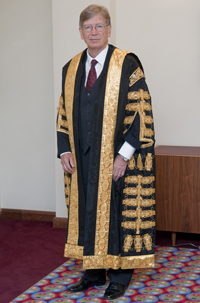 Donna Laframboise has been doing some interesting research on the Climate and Law conference recently held by the UK's Supreme Court. It seems that as well as Philippe Sands, several other judges used the occasion to advance their environmentalist views.
Donna Laframboise has been doing some interesting research on the Climate and Law conference recently held by the UK's Supreme Court. It seems that as well as Philippe Sands, several other judges used the occasion to advance their environmentalist views.
Prominent among them was Lord Carnwath, who called the Paris conference a test of our ability to address the challenges of climate change. It does seem extraordinarily unprofessional - if not outright corrupt - of these people to use public funds and their positions of public trust to promote their ideological fads.
Carnwath is an interesting chap. I read for example that tomorrow he is to hear a case in which Donald Trump tries to prevent an offshore windfarm being built next to his golf course development in Aberdeenshire. At the start of the year he took part in a ruling on the Viking windfarm in Shetland, rejecting attempts to prevent it going ahead. He was also involved in a case in which a group called "Client Earth" forced the UK to formulate new air quality standards.
Quite why he didn't step down from all these cases is beyond me.
But there's another interesting angle to this. Cast your mind back to 2012, and the extraordinary FOI tribunal at which Tony Newbery's request for the identities of the 28gate seminar attendees was rejected by what amounted to a kangaroo court. As Andrew Orlowski later revealed, this might have had at least some connection with the fact that one of the lay judges was a vocal green activist who had been badmouthing Nigel Lawson just a few days earlier. Indeed it turned out that several tribunal judges at the time had environmental connections - an official from the Joseph Rowntree Trust - perennial funders of green causes - as well as two ex-Defra officials and a representative of a church environment group,
Now I bet you can't work out who had been head of the tribunals service for the five years prior to 2012.
Indeed. It was none other than Lord Carnwath! He had stepped down a few months before Newbery's case, but one can't help but wonder about his influence on the tribunals service during his years in charge.
After Newbery's hearing, Andrew Orlowski asked the tribunals service about conflicts of interest among its lay judges:
We asked the Information Commissioner's Office how a lay judge with such partisan views on climate change came to oversee hearings so closely coupled to the subject of climate. Campaigning lay judges would not normally be appointed to sit on such a case, a spokesman noted, and concerns would be legitimate grounds for appeal.
Campaigning lay judges are a no-no then. But what about campaigning professional judges? I'm sure Donald Trump would like to know.
 Bishop Hill
Bishop Hill